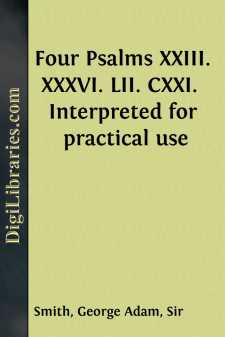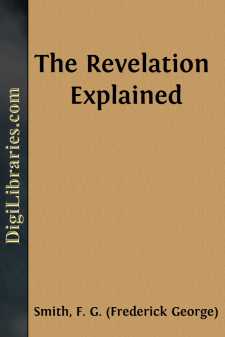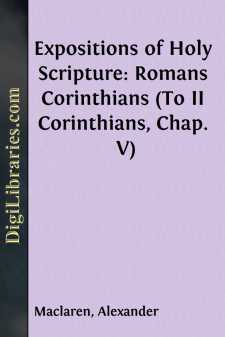Religion
- Agnosticism 2
- Antiquities & Archaeology 21
- Atheism 12
- Biblical Criticism & Interpretation
- Biblical Meditations 3
- Biblical Reference 1
- Biblical Studies 11
- Buddhism 8
- Christian Church 52
- Christian Education 5
- Christian Life 26
- Christianity 60
- Cults 2
- Devotional 6
- Eastern 2
- Education 4
- Eschatology 1
- Ethics 3
- General 60
- Gnosticism 1
- Hinduism 15
- History 28
- Holidays 10
- Inspirational 1
- Islam 8
- Judaism 3
- Leadership 1
- Meditations 3
- Monasticism 1
- Mysticism 11
- Philosophy 4
- Prayer 26
- Prayerbooks 5
- Religion & Science 12
- Sermons 54
- Spirituality 53
- Theism 2
- Theology 17
- Theosophy 15
Biblical Criticism & Interpretation Books
Sort by:
GOD OUR SHEPHERD The twenty-third Psalm seems to break in two at the end of the fourth verse. The first four verses clearly reflect a pastoral scene; the fifth appears to carry us off, without warning, to very different associations. This, however, is only in appearance. The last two verses are as pastoral as the first four. If these show us the shepherd with his sheep upon the pasture, those follow...
more...
Nature of Symbolic Language. Before proceeding with the interpretation of this wonderful book, it will be necessary for us to pause and make inquiry concerning the nature of the language employed in its prophecies and concerning the mode of its interpretation. It will be seen at a glance that it is wholly unlike the common language of life; and it will be useless for us to undertake to ascertain its...
more...
The Hebrew Prophecies In the last chapter the opinion was expressed that the first books collected by Nehemiah, when he made up his "library," a century after the Exile, were the writings of the prophets. We studied the historical books first, because they stand first in the Hebrew Bible, and are there named the "Earlier Prophets;" but the probabilities are that the prophetical writings...
more...
THE WITNESS OF THE RESURRECTION‘Declared to be the Son of God with power, ... by the resurrection of the dead.’—ROMANS i. 4 (R. V.).It is a great mistake to treat Paul's writings, and especially this Epistle, as mere theology. They are the transcript of his life's experience. As has been well said, the gospel of Paul is an interpretation of the significance of the life and work of Jesus...
more...
I.—INTRODUCTION. Perhaps the most striking characteristic of the life of David is its romantic variety of circumstances. What a many-coloured career that was which began amidst the pastoral solitudes of Bethlehem, and ended in the chamber where the dying ears heard the blare of the trumpets that announced the accession of Bathsheba's son! He passes through the most sharply contrasted conditions,...
more...






